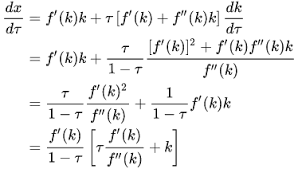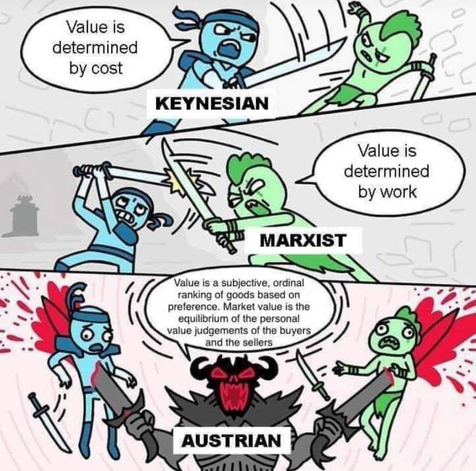"Economics" - a dubious science
Why do I consider "Economics" to be a dubious science?
Etymology:
- The word "economics" is derived from Greek "oikonomia" which means "to direct a single household". Aristotle then used 'oikonomia' also for the management of an entire city-state. This "suggests that people in a community possess a common and congruent set of values and goals". In my opinion, this is an unrealistic assumption and it is the basis for politicians to centrally plan the "economy".
- Ludwig von Mises therefore suggests the word catallaxy defining it as "the order brought about by the mutual adjustment of many individual economies in a market" (from the Greek verb katallasso which meant not only "to exchange" but also "to change from enemy into friend.").
Study/ curriculum of "Economics":
- In other sciences (as linguistics) the first academic year is dedicated to the definition of the study subject, e.g.
- What is linguistics?
- What are key determinants of linguistics, such as memes, phonemes, lexemes, etc.?
- What are the interrelations between different fields within linguistics?
- The curricula of "Economics" mostly jump directly to important concepts like demand/supply and afterwards to dubious models like "models of economic growth", nonsense like that

Important terms/concepts are not taught. In my opinion in the first academic year, students should first of all learn about the following topics:- Philosophy / Logic / Argumentation: Economists make innumerable assumptions (partially explicit, partially without knowing it), then make analyses (wildly aggregating data with further assumptions as normal distributions 🤡) and come to certain conclusions. Many papers I read fail to acknowledge the limited validity of these conclusions.
- Human needs: "Economics" is a social science, not a natural science.
- Incentives: Humans are motivated by incentives, and incentives play a huge role in human actions and interactions.
- Money: money is by far the most important good in an economy. 50% of all trades or purchases consist of money (for each product bought, money changes hands). For every transaction I do (e.g. buying a PC which costs 500$), I compare the value I attribute to 500$ to the value I attribute to that PC (see graphic below). If we have a dysfunctional monetary system, this comparison is flawed, which in our time leads to overconsumption and excessive debt.

In my opinion, academic "Economics" has failed students and society. Many economists today are "educated fools" (Taleb calls them "intellectual yet idiot", https://medium.com/incerto/the-intellectual-yet-idiot-13211e2d0577) who spent years in university and still think we live in a market economy though the most important good (money) is centrally planned.
I really hope that technological change will overhaul the "economics" field, e.g. via
- open platforms (Hive 😎) that enable open, objective science (not financed by governments) with open discussions (not exclusively for "scientists"). Everybody should be allowed to take part in scientific discovery.
- Bitcoin which could (or will) challenge and change society's understanding of money enormously
Have a great week!
Sources:
http://dictionary.sensagent.com/Catallaxy/en-en/
https://en.wikipedia.org/wiki/Catallaxy
https://en.wikipedia.org/wiki/Catallactics
https://en.wikipedia.org/wiki/Mathematical_economics
Warum halte ich "Ökonomie" für eine zweifelhafte Wissenschaft?
Etymologie:
- Das Wort "Ökonomie" leitet sich vom griechischen "oikonomia" ab, was "einen einzelnen Haushalt führen" bedeutet. Aristoteles benutzte "oikonomia" dann auch für die Verwaltung eines ganzen Stadtstaates. Dies deutet darauf hin, dass die Menschen in einer Gemeinschaft gemeinsame und kongruente Werte und Ziele besitzen". Meiner Meinung nach ist dies eine sehr unrealistische Annahme, und es ist die Grundlage für Politiker, die "Ökonomie" zentral zu planen.
- Ludwig von Mises schlägt daher das Wort "Katallaktik" vor, das er definiert als "die Ordnung, die durch die gegenseitige Anpassung vieler einzelner Haushalte/Ökonomien in einem Markt entsteht" (vom griechischen Verb katallasso, was nicht nur "tauschen", sondern auch "vom Feind zum Freund werden" bedeutet).
- Im Deutschen haben wir zum Glück noch das Wort Wirtschaft, das weniger politisch belastet ist und sich von der Gastwirtschaft ableitet, ein schönes Beispiel für menschliches Handeln 🍻
Studium "Ökonomie":
- In anderen Wissenschaften (wie der Linguistik) ist das erste Studienjahr der Definition des Studienfachs gewidmet, z.B.
- Was ist Linguistik?
- Was sind die wichtigen Determinanten, d.h. was ist ein Mem, Phonem, Lexem usw.?
- Was sind die Wechselbeziehungen zwischen verschiedenen Bereichen innerhalb der Linguistik?
- Die Lehrpläne der "Ökonomie" beginnen meist direkt mit wichtigen Konzepten wie Angebot/Nachfrage und springen dann zu zweifelhaften Modellen wie "Modelle des ökonomischen Wachstums", solchen Unsinn...

Wichtige Begriffe für ein Verständnis des Studienfachs werden nicht thematisiert. Meiner Meinung nach sollten sich die Studenten im 1. Studienjahr v.a. mit den folgenden Themen beschäftigen:- Philosophie / Logik / Argumentation: Ökonomen machen unzählige Annahmen (teilweise explizit, teilweise ohne es zu wissen), machen dann Analysen (wildes Aggregieren von Daten mit weiteren Annahmen wie Normalverteilungen LOL) und kommen zu bestimmten Schlussfolgerungen. Viele Artikel, die ich gelesen habe, weisen nicht auf die begrenzte Gültigkeit dieser Schlussfolgerungen hin.
- Menschliche Bedürfnisse: "Ökonomie" ist eine Sozialwissenschaft, keine Naturwissenschaft.
- Anreize: Menschen werden durch Anreize motiviert, und Anreize spielen eine große Rolle bei menschlichen Handlungen und Interaktionen.
- Geld: Geld ist das bei weitem wichtigste Gut in einer Wirtschaft. 50% aller Handels- oder Kaufgeschäfte bestehen aus Geld (für jedes gekaufte Produkt wird im gleichen Wert Geld getauscht). Bei jeder Transaktion, die ich durchführe (z.B. beim Kauf eines PCs, der 500$ kostet), vergleiche ich den Wert, den ich 500$ zuschreibe, mit dem Wert, den ich diesem PC zuschreibe (siehe Grafik unten). Wenn wir ein dysfunktionales Geldsystem haben, ist dieser Vergleich fehlerhaft, was in unserer Zeit zu Überkonsum und Überschuldung führt.

Meiner Meinung nach hat die akademische "Ökonomie" versagt, gegenüber ihren Studenten und der Gesellschaft. Viele "Ökonomen" sind heute "gebildete Dummköpfe" (Taleb nennt sie "intellectual yet idiot", https://medium.com/incerto/the-intellectual-yet-idiot-13211e2d0577), die Jahre an der Universität verbracht haben und immer noch denken, dass wir in einer Marktwirtschaft leben, obwohl das wichtigste Gut (Geld) zentral geplant wird.
Ich hoffe, dass der technologische Wandel die "Ökonomie" generalüberholen wird, z.B. durch
- offene Plattformen (Hive 😎), die eine offene, objektive Wissenschaft ermöglichen (d.h. nicht von Regierungen finanziert), mit offenen Diskussionen (nicht ausschliesslich für "Wissenschaftler").
- Bitcoin, der das Verständnis der Gesellschaft von Geld enorm verändern wird.
Have a nice week!
Du hast ein Upvote von mir bekommen, diese soll die Deutsche Community unterstützen. Wenn du mich unterstützten möchtest, dann sende mir eine Delegation. Egal wie klein die Unterstützung ist, Du hilfst damit der Community. DANKE!
Good day. Time makes its own adjustments, which was previously considered the peak of science, today it is already a dense forest. And if teachers do not make adjustments for the time, then educated fools are obtained. Thanks for the interesting and informative post. Thanks you.
Kann deiner DGL nicht folgen. Und was genau ist daran Unsinn^^
Die DGL ist aus dem mittleren Bereich von dieser Seite: https://en.wikipedia.org/wiki/Mathematical_economics
Mathematisch betrachtet ist sie überhaupt kein Unsinn, sondern sehr interessant. Aber sie ist reine Theorie.
Auch wenn es formelmässig kompliziert aussieht, ist das Modell extrem simpel, weil es auf nur einer Handvoll Variablen und auf der Produktionsfunktion beruht. Ausgeblendet werden u.a. monetäre Phänomene, was sie angesichts der Bedeutung der Geldpolitik der letzten Jahrzehnte vollkommen unbrauchbar macht.
Ausserdem nicht berücksichtigt sind unterschiedliche Branchen und unterschiedliche Anreize (weil Löhne in der Realität nicht bei allen Personen gleich hoch sind).
Es ist ein Top-down-Ansatz, für den so viele individuelle Informationen aggregiert werden müssen, dass die Aussagekraft letzten Endes Null ist.
We will see!
LG Michael
!invest_vote
@mima2606 denkt du hast ein Vote durch @investinthefutur verdient!
@mima2606 thinks you have earned a vote of @investinthefutur !
Thanks you
Bravissimo 👏🏻
Grüezi Züri!
Interessante relativierung der Definition Wirtschaft. Ich bin der Meinung das Bitcoin als unabhängige Wertreferenz die heutige Ökonomie überholen könnte.
Salü Ivan
Das hoffe ich auch. Ein Wertmass muss fix sein.
Der Meter ist ja auch klar definiert und wird nicht jedes Jahr ein bisschen inflationiert.
well, how are universities financed?
maybe with the help of planned economy and especially the money monopoly?
do you really think they would then teach and talk against this financing monopoly?
but I guess that goes too deep and may be labelled as "conspiracy theory" again.
"well, how are universities financed?
maybe with the help of planned economy and especially the money monopoly?"
"do you really think they would then teach and talk against this financing monopoly?"
"but I guess that goes too deep and may be labelled as "conspiracy theory" again."
still it can be a conspiracy not only against Austrian Economics, but also the whole humanity
in clear view. but for 95% of people not understandable cuz they know absolutely nothing about economics and about how important it is for us.
and the few who know it (who for example have learned Volkswirtschaft/ Betriebswirtschaft lie to themselves.
and all just run after the money monopoly. of course you dont need black man an stuff blabla if you ALREADY GOT THE MONEY MONOPOLY - lol
conspiracy theory in plain sight, and everyone takes part. :)
"conspiracy theory in plain sight, and everyone takes part. :)"
the plot will come cuz as I said most people dont understand economics.
most people don't know about the money monopoly and also not about its effects. most people dont even know what capitalism is and what its effects are.
..and that's why it can be in plain sight.
the masses always supported the craziest and most terrifying "conspiracies" of our history - ofc also cuz many were forced to and in hope or fear
Academia is since a few decades not neutral anymore, in contrary. Most universities in Austria are moving to the left side in a dramatic speed. With half communists you can´t objectively discuss about economics.
In Germany it is even worse. Remember when Lucke wanted to return to Uni to give a lecture in Economy? It is a shame how he was treated.
If someone wants to become a scientist in economy, he might formally study in Austria or Germany, but he needs to broaden his horizon with that topics you rightfully mentioned (are they thought in other countries?) in other to get a meaningful knowledge base.
In college and as a "sociologist" I used to argue with "economists" all the time. I frequently told them "Hey, we're the same. You're just better with math and graphs."
Here is something I wrote 3 years ago regarding economics: https://peakd.com/blog/@vimukthi/why-economics-is-not-an-empirical-science-but-a-synthetic-a-priori-analysed-and-explained-with-comedy
Oh, that's a great article.
I also wanted to reference "Human Action", but then forgot to mention it. It's the best book on catallaxy (including "economics") I've read...
Human Action is literally the Bible of economics for me. The fundamentals are so solid and intuitive.
I think the quotes should be around "science". Economics is, in my mental model, the study of modelling. The systems they try to predict are too complex with too many assumptions and rely on rational communities.
This isn't possible, but without the study of economics the entire field of data science wouldn't be as developed as it is today, and without data science we wouldn't have machine learning, etc
Der Wert und damit der Preis definiert sich über die Einzigartigkeit und das Alleinstellungsmerkmal im Kontext der Präferenzen des Marktes.
Der Preis ist umso höher je stärker das Alleinstellungsmerkmal ausgeprägt ist und zu entsprechenden Präferenzen im Streben nach diesem Produkt führt.
Genau darin - also in der Innovation und der Innovationskraft - liegt das Geheimnis für Wohlstand und Arbeitsplätze in einer Gesellschaft.
Ohne Innovation und Marktführerschaft in den betreffenden Produktbereichen gibt es auch keine Knete keine Preissetzungsmacht und somit auch keinen Wohlstand der entsprechend Arbeitsplätze und Wohlstand für den Rest der Bevölkerung bringt...